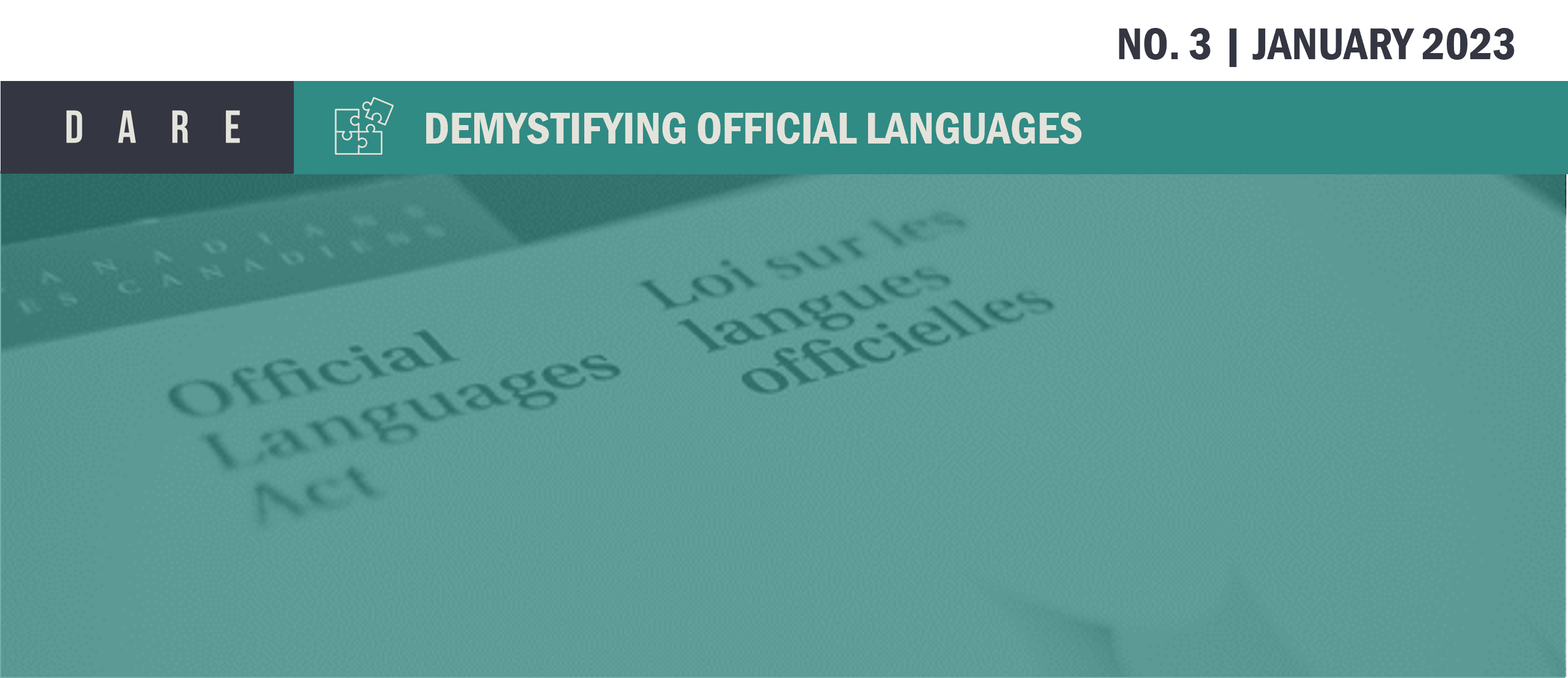Important: The GCConnex decommission will not affect GCCollab or GCWiki. Thank you and happy collaborating!
CNOLC-newsletter-no3/demystifying
DEMYSTIFYING OFFICIAL LANGUAGES
The purpose of this vignette is to clarify and explain certain concepts, articles, mechanisms and roles related to official languages.
In this issue, we provide an overview of the key elements of the Council’s 2023–2026 Strategic Plan: Acting for Change.
ABOUT THE COUNCIL
First, the Council is a horizontal organization of the Government of Canada in which departments, agencies, Crown corporations and regional federal councils work together. The 25-member body provides a voice for the 215 champions across the federal public service, serves as an agent of influence and mobilization, and promotes common approaches.It is led by two co-chairs, who act as official languages champions in their respective organizations, and it is supported by a national coordinator.
REVIEW OF THE 2018–2021 STRATEGIC PLAN
The 2018–2021 Strategic Plan expired on March 31. Despite the problems caused by the pandemic, all key activities were completed, including the following:
- An awareness campaign for leaders on the importance of setting the tone for official languages;
- The launch of the Dare newsletter, a biannual publication for official languages champions;
- Work in collaboration with the Translation Bureau to identify initiatives by all federal institutions on a single page: the Official Languages Hub®;
- A new Official Languages Champions’ Toolbox that contains over 200 tools and resources, including a Reference Guide for champions, and infographics about the Council and the role and responsibilities of champions;
- Organizing events with an average of 10 times more participants: Official Languages Day and the Best Practices Forum on Official Languages;
- Better regional representation on the Council and greater consideration of official languages issues across the country.
WHAT ARE THE ENHANCEMENTS SINCE THE INTRODUCTION OF BILL C- 32 IN JUNE 2021?
The powers of the Treasury Board will be further strengthened, allowing for improved official languages coordination and accountability across the Government of Canada.
- The Commissioner of Official Languages will have a new power, namely, the power to impose administrative monetary penalties on certain privatized entities and Crown corporations in the transportation sector communicating with and serving the travelling public.
- There will be a more detailed Francophone immigration policy with objectives, targets and indicators, in order to increase Francophone immigration to Francophone minority communities, as immigration is a factor contributing to the demographic weight of those communities.
- The new rights in federally regulated private businesses in Quebec and in regions with a strong Francophone presence, which make it possible to work and receive service in French in these businesses, will now be introduced via a new statute.
- There will be new wording that is more explicit about the importance of Canada’s two major language communities.
- There will be better direction on positive measures to be taken by federal institutions, for the benefit of official language minority communities and the advancement of English and French across Canada.
- Wording concerning emergencies will be added to the Act in order to provide a clearer reminder for federal institutions that the rights and safety of Anglophones and Francophones must be protected even in emergencies.
- The principles of statutory interpretation will now include the principle of the remedial nature of language rights, which seeks to remedy past injustices and ensure greater protection for official language minority communities across Canada.
- Minority language education will be supported by creating a process obligation for the federal government’s commitment to contribute to an estimate of the number of children whose parents have the right to have them educated in the minority official language.
- There will be stronger provisions on court decisions that must be translated, resulting in immediate translation of a greater number of decisions issued by federal courts.
WHAT CONCRETE ACTIONS CAN OFFICIAL LANGUAGES CHAMPIONS TAKE?
Official languages champions are in a unique position to support their organization and ensure that all the required components are implemented in advance. Given the strengthened oversight powers of the Treasury Board and the Commissioner of Official Languages, it is likely that additional systematized mechanisms will be established. Therefore, preparatory work will need to be carried out in federal institutions to help support the monitoring, evaluation, and audit cycles.
For example, champions could:
- notify their organization’s executive committee of upcoming changes;
- consult with the persons responsible for official languages to assess whether the human and financial resources needed to conduct these exercises are available, and which ones will be required;
- initiate discussions with the persons responsible for coordinating section 41 of the OLA to immediately systematize the identification of positive measures.
If you have any questions about the modernization of the OLA, please contact Canadian Heritage’s Official Languages Branch.
FOR MORE INFORMATION




